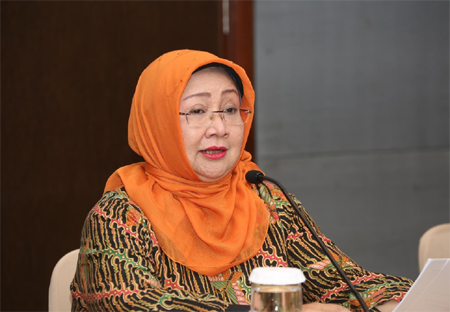IPB University’s Lecturer Found Antibiotic-resistant Bacteria Killer

In 1928, Alexander Fleming found antibiotic to cure people who were infected by bacteria. But in 2014, World Health Organization (WHO) claimed that there are lots of death caused by bacteria infection. Antibiotic may cause resistance.
IPB University’s lecturer, Permanent Professor of Faculty of Mathematics and Natural Sciences Bogor Agricultural University, Prof Dr dr Sri Budiarti, mentioned that enteropathogenic bacteria E. coli (EPEC) is found in 55 percent of diarrhea patient’s fecal. Fifty percent of EPEC bacteria are resistant to antibiotic in wider spectrum. Besides EPEC, pathogenic bacteria (Proteus mirabilis, cause of urinary tract infection) is also antibiotic resistant.
“A lot of findings about antibiotic-resistant bacteria are making medical expert restlessly look for solution to prevent increasing antibiotic resistance. We have found an antibiotic-resistant pathogen-killer virus in our research. The virus is called lytic bacteriophage. In 2018, an innovation related patent is awarded,” she said in a press conference before Professor Scientific Oration in IPB International Convention Center (IICC), Bogor (9/1).
There are some findings in lytic bacteriophage, by Prof. Sri Budiarti and team, such as diarrhea-causing lytic bacteriophage, urinary-tract-infection-causing lytic bacteriophage, skin-infection-causing lytic bacteriophage, burn-causing lytic bacteriophage, and others.
For example, FB4 and FBD3 lytic phages, isolated from wastewater and household waste, are able to break down diarrhea-causing EPEC. FU3 lytic phage for uropathogenic E. coli (UPEC), causing urinary tract infection, is successfully isolated from Cisadane River, West Java. Bacillus pumilus lytic phage (having toxic effect to human epithelia cell) is also successfully isolated from Ciapus River, Bogor.
“There are 15 cases in total which utilize bacteriophage as alternative therapy. But, there hasn’t yet in Indonesia. Very little knowledge in utilizing this technology is due to bacteriophage’s control mechanism, which is host specific. Therefore, pathogenic bacteria identification is highly needed. Besides that, research and development for this therapy needs proffesional human resource in isolation and bacteriophage production. We need to increase amount of microbiology experts and biotechnology by empowering biology," explained her.
According to her, distribution of antibiotic as well as lytic phage, is having better potential of healing. Besides that, preventing infection of antibiotic-resistant bacteria needs extra sanitation, clean water supply, and nutritive food supply for body immune.
"This innovation successfully shows that IPB University is able to produce bachelors with high competence. In this opportunity, I also encourage implementation of biology in education since early childhood education. With the early knowledge of biology, Indonesian people are expected to maintain personal health and environment," she adds. (IAAS/RH)


